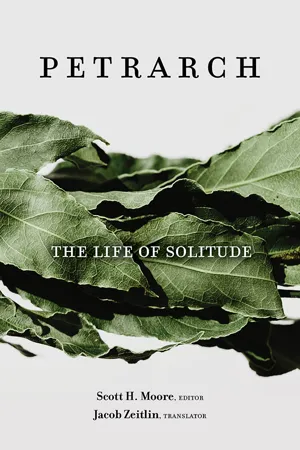
- 244 pages
- English
- PDF
- Available on iOS & Android
The Life of Solitude
About this book
Francesco Petrarca (Petrarch, 1304-1374) is universally regarded as one of the greatest Italian poets and considered to be the "Father of Renaissance Humanism." Petrarch is best known for his poetry, and especially for his sonnets, composed in the vernacular Italian dialect of his homeland. But Petrarch was also the author of an extraordinary body of prose works in Latin, including numerous books, essays, and volumes of his letters, which, with Cicero as his model, he collected, edited, and preserved for posterity.
Included among these Latin prose works is The Life of Solitude ( De vita solitaria), which Petrarch began during Lent of 1346, and then sent in 1366--after twenty years of reflection, addition, and correction--to its dedicatee. Book I contains an argument for why a life of solitude and contemplation is superior to a busy life of civic obligation and commerce. Book II contains a long enumeration of exemplars of the solitary life drawn from history and literature (and occasionally mythology). Included in Book II are provocative digressions on whether one has an obligation to serve a tyrant and on the failures of contemporary monarchs to recover the holy sites in the East. Petrarch's solitary life is not an apology for monastic solitude. On the contrary, it contains a strong defense of friendship, the pursuit of virtue, and the roles that both secular and religious literature and philosophy play in human flourishing.
This updated edition of Jacob Zeitlin's 1924 English translation restructures and numbers the text to make it consistent with the best available scholarly editions of De vita solitaria. The volume includes a new introduction by Scott H. Moore, Associate Professor of Philosophy and Great Texts and Assistant Director of the University Scholars Program at Baylor University, which situates Petrarch and the text within the larger traditions of virtue ethics, renaissance humanism, and reflections on the solitary life.
Frequently asked questions
- Essential is ideal for learners and professionals who enjoy exploring a wide range of subjects. Access the Essential Library with 800,000+ trusted titles and best-sellers across business, personal growth, and the humanities. Includes unlimited reading time and Standard Read Aloud voice.
- Complete: Perfect for advanced learners and researchers needing full, unrestricted access. Unlock 1.4M+ books across hundreds of subjects, including academic and specialized titles. The Complete Plan also includes advanced features like Premium Read Aloud and Research Assistant.
Please note we cannot support devices running on iOS 13 and Android 7 or earlier. Learn more about using the app.
Information
Table of contents
- Cover Page
- Half Title Page, Title Page, Copyright, Dedication, Epigraph
- Contents
- Chronology of Petrarch’s Intellectual World
- Introduction
- THE LIFE OF SOLITUDE
- Preface
- BOOK 1
- 1. Introduction
- 2. The Misery of the Busy Man and the Happiness of the Solitary Man
- 3. The Difference in the Lot of the Busy Man and the Solitary Man
- 4. Virtues of the Solitary Life
- 5. Sweetness of the Solitary Life
- 6. Freedom of the Solitary Life
- 7. Nature and Friendship in the Solitary Life
- 8. Joy of the Solitary Life
- 9. Boredom and Vulgarity of City Life
- 10. Temperance and the Solitary Life
- BOOK 2
- 1. Examples from History
- 2. Biblical Patriarchs
- 3. Prophets
- 4. Saints: Silvester to Augustine
- 5. Saints: Jerome and Some Virtuous Women
- 6. Saints: Gregory the Great to Francis
- 7. Saints: Remigius and Bernard
- 8. Saints: Carloman to Celestine V
- 9. A Digression on the Loss of the Holy Land and the Cowardice of Our Princes and Popes
- 10. Most Exalted Examples of Solitary Life: Christ, Mary, and David
- 11. Non-Christian Examples
- 12. Philosophers and Poets
- 13. Emperors and Military Leaders
- 14. The Nature and Virtues of This Solitary Life
- 15. Refutations and Commendations
- Appendix: De vita solitaria: Sections and Chapters according to the Bâle Edition, 1554